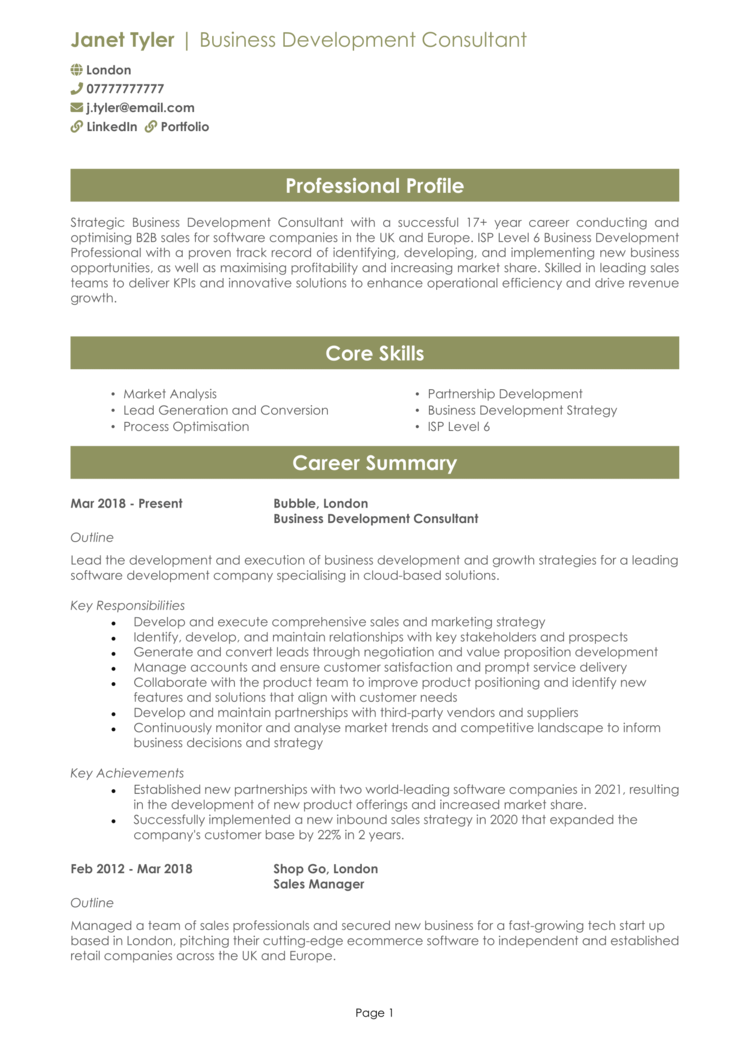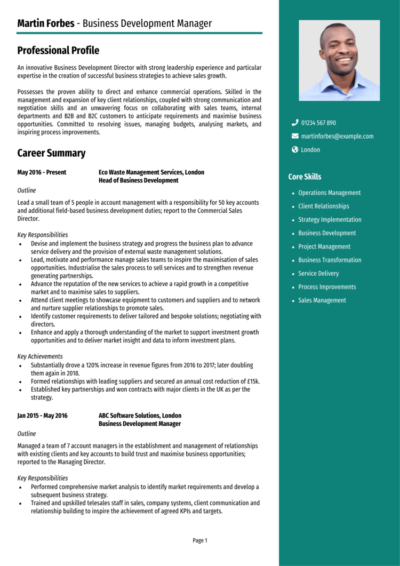Whether you’re closing deals, expanding market reach, or crafting sales strategies, your ability to generate revenue is what businesses need. But before you can boost another company’s bottom line, you need to secure the role first.
These Business Development Manager CV examples and the simple writing guide will help you highlight your expertise, achievements, and skills – so you can land your next business development role with confidence.
Business Development Manager CV example

Business Development Consultant CV example

How to write your Business Development Manager CV
Learn how to create your own interview-winning Business Development Manager CV with this simple step-by-step guide.
A successful business development strategy relies on a solid plan – your CV is no different. If recruiters can’t immediately see your key strengths, they won’t waste time searching for them.
This guide will walk you through how to format your CV, showcase your ability to drive business growth, and present your achievements in a way that ensures hiring managers see your value. By the time you’re done, your CV will be as compelling as your best sales pitch.
The correct structure for a Business Development Manager CV


A scattered CV is like an unclear sales pitch – if hiring managers don’t see the value fast, they’ll move on. Coherent layouts allow recruiters to quickly assess your expertise and track record in business development.
Here’s the structure you should follow:
- Name and contact details – Place your name and contact information prominently at the top of your CV for quick access. Adding a photo is up to you.
- Profile – Open with a compelling overview of your skills, experience, and value you’ll bring to a company.
- Core skills – List your key abilities in this section, focusing on those that will be most relevant to the job.
- Work experience – Provide a detailed breakdown of your work history, starting with the most recent job first.
- Education – List your qualifications, including degrees and relevant certifications, in reverse chronological order.
- Additional info – Use this optional space for relevant hobbies, awards, or personal pursuits that enhance your application.
Business Development Manager CV format


Writing a CV which is cluttered is like an unclear business strategy – it just won’t get the results you’re after. Keep your CV format clean and easy to read so visual mistakes don’t district recruiters from your expertise.
The useful tips will help enhance your formatting:
- Bullet points – Use short, sharp bullet points to present your responsibilities and achievements clearly.
- Divide sections – Make use of distinct headings and logical spacing to guide recruiters through your CV.
- Use a clear and readable font – A simple, professional font ensures readability while keeping the layout polished and tidy.
- No more than 2 pages – This gives you the length you need to detail your experience while keeping it concise enough to respect the recruiter’s time.
The best way to write a Business Development Manager CV profile


Now for the part where you hook the recruiters’ attention and convince them that you’re the right one for the job. Your CV profile is your elevator pitch – a brief but powerful introduction that outlines your expertise in business development. It should immediately highlight what you bring to the table and why hiring you is a smart investment.
Business Development Manager CV profile examples
Profile 1
Results-driven Business Development Manager with four years of experience in identifying new market opportunities, building client relationships, and driving revenue growth. Skilled in lead generation, contract negotiation, and sales pipeline management. Proficient in CRM tools such as Salesforce and HubSpot. Passionate about developing strategic partnerships and maximising business potential.
Profile 2
Strategic Business Development Manager with three years of experience in B2B sales, market expansion, and client acquisition. Adept at developing tailored sales strategies, managing key accounts, and driving business growth. Experienced in working with cross-functional teams to implement data-driven business solutions. Committed to achieving ambitious targets and fostering long-term client relationships.
Profile 3
Experienced Business Development Manager with over six years of expertise in growing revenue streams, expanding client bases, and driving business strategy. Skilled in networking, proposal writing, and strategic planning. Proficient in market research tools and competitor analysis to identify high-value opportunities. Dedicated to delivering impactful business solutions that drive profitability and long-term success.
What to include in your Business Development Manager CV profile
Your profile should include the following:
- Industry experience – Highlight the sectors you’ve worked in, whether B2B, SaaS, finance, or another market.
- Revenue growth – Showcase how you’ve helped businesses increase sales, acquire clients, or expand into new markets.
- Strategic partnerships – Mention your experience in developing relationships with key stakeholders, clients, or investors.
- Sales and negotiation – If you’ve led pitches, closed major deals, or secured long-term contracts, highlight it here.
- Market expansion – Demonstrate how you’ve helped businesses break into new markets or strengthen their competitive edge.
Core skills section


When recruiters open up any application, they’re already scanning for the keywords that the right candidate would include. Hard, tangible skills will make you stand out and show you can actually get the job done.
The best part? It’s really easy to tailor CV skills to different jobs. If the role is focused on partnerships, highlight relationship management and contract negotiation. If it’s revenue-driven, emphasise lead generation, sales forecasting, and pipeline management.
Top skills for your Business Development Manager CV
- Sales Strategy Development – Creating and implementing strategic plans to drive revenue growth and expand market reach.
- Lead Generation and Prospecting – Identifying new business opportunities through networking, cold outreach, and market research.
- Client Relationship Management – Building and maintaining strong relationships with clients to foster long-term partnerships.
- Market Research and Competitor Analysis – Analysing industry trends, market conditions, and competitor activity to refine business strategies.
- Negotiation and Deal Closing – Securing profitable contracts and agreements through persuasive negotiation skills.
- Revenue Forecasting and KPI Tracking – Monitoring sales performance, setting targets, and analysing key performance indicators.
- Proposal and Presentation Development – Creating compelling business proposals, sales pitches, and presentations for clients and stakeholders.
- Partnership Development – Collaborating with strategic partners to expand business opportunities and joint ventures.
- Budget and Financial Planning – Managing budgets, pricing strategies, and financial projections to support business growth.
- Cross-Department Collaboration – Working with sales, marketing, and product teams to align business goals and strategies.
Work experience


Employers want to see more than just job titles – they want proof that you can drive results. Your experience should demonstrate exactly how you’ve driven business growth in the past, and how you’ll continue that track record into your new role.
List your roles in reverse chronological order, ensuring each entry is structured with bullet points. If you’ve worked in multiple industries, focus on transferable skills and quantifiable successes.
Writing job descriptions for past roles

- Outline – Introduce the company, your role, and the business objectives you were responsible for.
- Responsibilities – List key tasks, such as market analysis, lead generation, or partnership development. Use action words like “negotiated”, “expanded”, and “secured”.
- Achievements – Highlight measurable successes, such as revenue increases, client acquisitions, or market share growth.
Job examples for Business Development Manager
Business Development Manager | Vertex Solutions
Outline
Led business growth initiatives at a B2B services provider, identifying new opportunities, developing client relationships, and executing targeted sales strategies to expand market reach.
Responsibilities
- Developed and implemented strategic sales plans to expand the company’s client base.
- Identified and pursued high-value prospects, managing the full sales cycle from lead generation to closing deals.
- Negotiated contracts and pricing agreements to maximise revenue and ensure long-term partnerships.
- Conducted market research to identify emerging trends and competitive insights.
- Collaborated with marketing and product teams to align business strategies with customer needs.
Achievements
- Increased revenue by 35 percent within 12 months by securing new business partnerships.
- Expanded the client base by 40 percent through targeted lead generation strategies.
- Recognised for exceeding quarterly sales targets and delivering exceptional customer engagement.
Business Development Manager | SummitTech
Outline
Developed and executed sales strategies for a technology firm, driving growth in enterprise solutions and SaaS platforms by securing high-value contracts and expanding the customer base.
Responsibilities
- Identified potential clients and developed tailored proposals to meet their business needs.
- Managed the sales pipeline, tracking opportunities and forecasting revenue growth.
- Built strong client relationships through regular meetings and customised sales approaches.
- Led product demonstrations and negotiations to secure long-term contracts.
- Analysed market trends and customer feedback to refine business strategies.
Achievements
- Increased client retention by 25 percent by introducing a customer engagement programme.
- Secured £1M in new business deals within the first year.
- Optimised the sales process, reducing the average deal closing time by 20 percent.
Business Development Manager | EliteGlobal
Outline
Drove business growth at a multinational corporation by identifying new revenue streams, strengthening strategic partnerships, and expanding the company’s market presence in competitive sectors.
Responsibilities
- Developed and managed strategic partnerships with key clients and stakeholders.
- Conducted in-depth competitor analysis to identify unique selling propositions.
- Created and delivered sales presentations to high-profile clients and investors.
- Worked closely with internal teams to develop innovative solutions for business expansion.
- Implemented data-driven sales techniques to improve conversion rates and customer acquisition.
Achievements
- Generated a 30 percent increase in annual revenue through targeted business development strategies.
- Established key partnerships that led to long-term contracts worth over £500K.
- Recognised for leadership in driving company expansion into new market segments.
Education section


While experience is the main selling point for business development professionals, relevant qualifications can strengthen your application. As such, your education section should be short and to the point, but still comprehensive of all your relevant certifications.
List any degrees in business, marketing, or sales, as well as industry-specific certifications or training courses that have helped you develop your skills.
What are the best qualifications for a Business Development Manager CV?
- Degree in Business, Marketing, or Sales – A strong foundation for business development roles.
- Chartered Institute of Marketing (CIM) Certification – Useful for market-driven business development positions.
- Salesforce or HubSpot Certification – Valued in CRM-driven sales and business development roles.
- MBA (Master of Business Administration) – A great asset for senior-level business development professionals.
- Negotiation and Leadership Training – Essential for deal-making and relationship management.





